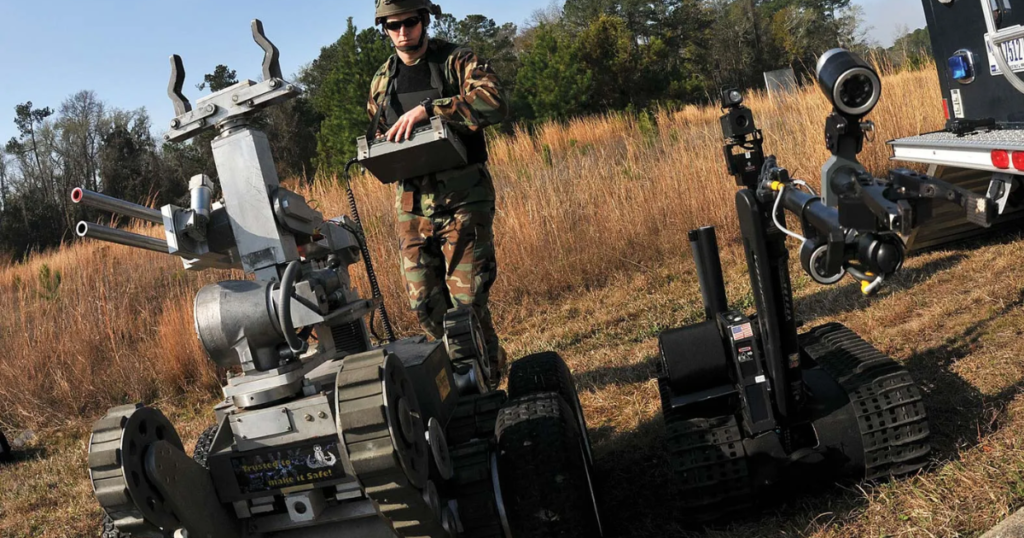Introduction
Artificial Intelligence (AI) has transformed numerous industries, from healthcare to finance. However, one of its most controversial applications lies in the realm of warfare. The development of autonomous weapons, commonly referred to as “killer robots,” raises ethical, strategic, and security concerns. While proponents argue that AI-driven systems can reduce casualties and improve precision, critics warn of a future where machines make life-and-death decisions without human intervention. This article explores the dangers of AI in warfare and whether the world is on the path toward autonomous conflict.
The Rise of AI in Warfare
AI technology is already being integrated into military operations worldwide. Nations are investing in AI-powered drones, surveillance systems, and automated defense mechanisms. Some of the most notable developments include:
- Autonomous Drones: AI-driven drones can conduct reconnaissance, surveillance, and even targeted strikes with minimal human input.
- Lethal Autonomous Weapons Systems (LAWS): These are designed to identify and engage targets without human intervention.
- AI-Powered Cyber Warfare: AI is used to launch sophisticated cyberattacks, disrupting enemy communications, financial systems, and infrastructure.
- Automated Defense Systems: Some militaries deploy AI-controlled missile defense systems capable of reacting faster than human operators.
While these technologies offer advantages in efficiency and accuracy, their risks cannot be ignored.

The Ethical Concerns of AI Weapons
One of the biggest debates surrounding AI in warfare is its ethical implications. The main concerns include:
1. Lack of Human Judgment
AI lacks human morality and decision-making capabilities. Unlike soldiers, who can assess a situation with ethical considerations, AI operates based purely on algorithms. This can lead to unintended civilian casualties and war crimes.
2. Accountability and Responsibility
If an AI weapon commits an atrocity, who is held accountable? The programmer, the manufacturer, the military commander, or the machine itself? The absence of clear accountability creates significant legal and moral dilemmas.
3. Potential for Mass Destruction
AI-driven weapons can act with unprecedented speed and scale. If misused, they could cause massive destruction before human intervention is possible, increasing the likelihood of large-scale conflicts.
4. Bias and Errors in AI Decision-Making
AI systems are only as good as the data they are trained on. If the data is biased or flawed, AI may make catastrophic errors, mistaking civilians for combatants or misidentifying strategic targets.
The Strategic Risks of AI Warfare
Beyond ethical concerns, AI warfare presents serious strategic risks:
1. Arms Race and Global Instability
As more countries develop AI-powered weapons, an arms race is inevitable. Nations will rush to outpace rivals, leading to increased military spending and instability.
2. Risk of Autonomous Warfare
If AI-driven weapons become widespread, conflicts could escalate rapidly without human oversight. Autonomous systems may misinterpret threats, launching attacks without diplomatic intervention.
3. Hacking and Cybersecurity Threats
AI weapons are vulnerable to cyberattacks. Hackers or rogue nations could manipulate AI systems, causing them to turn against their own operators or launch unauthorized strikes.
4. Loss of Human Control
The increasing autonomy of AI systems raises concerns about losing human control over warfare. Once deployed, these systems might act unpredictably, leading to unintended and potentially catastrophic consequences.
Can AI Be Regulated in Warfare?
Efforts are being made to regulate AI in warfare, but challenges remain. Some key approaches include:
- International Agreements: The United Nations and other global organizations are pushing for treaties to regulate autonomous weapons.
- Ethical AI Development: Tech companies and governments must implement strict ethical guidelines for AI in military applications.
- Human-in-the-Loop Policies: AI should always require human oversight in decision-making to prevent unintended consequences.
- Transparency and Accountability Measures: Nations developing AI weapons must be transparent about their capabilities and ensure accountability mechanisms are in place.
The Future: Are Killer Robots Inevitable?
The rapid advancement of AI suggests that autonomous weapons will play an increasing role in future warfare. However, whether they become fully independent decision-makers or remain under human control depends on regulatory efforts and ethical considerations. The global community faces a critical choice: harness AI’s potential responsibly or risk a future where war is fought without human conscience.
Conclusion
AI in warfare presents both opportunities and dangers. While it can enhance military precision and efficiency, the ethical and strategic risks are profound. Without strict regulation and oversight, autonomous weapons could redefine the nature of conflict, potentially making wars more devastating and uncontrollable. The question remains: will humanity choose to embrace or restrain the rise of killer robots?